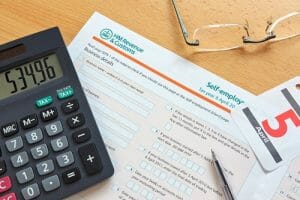All Things Tax For UK Expats

Expat tax affairs can be complicated, so GoSimple Tax have gathered some tips to help you understand your tax requirements as a UK expat that is still domiciled in the UK.
This article was written exclusively for Expat Network by SimpleTax
Income Tax
The tax you’ll need to pay within the UK on your foreign income will depend on whether or not you’ll be regarded as a UK resident. If you’re deemed non-resident you won’t need to pay any UK tax on any non-UK income you receive.
Please note that if you’re a both a UK resident and domiciled in the UK, you must pay UK tax on all your income, it won’t make a difference if you earned this income in the UK or overseas.
Residency rules are becoming increasingly complex and may not merely be based on the number of days you spend in the UK and is based on the Statutory Residency Test.
However, for tax purposes you’re normally considered a UK resident if you spend at least 183 days in the UK within the tax year.
Also if you meet the criteria of the Automatic Overseas Test you would be considered as non-resident. The tests are:
- You were considered as a UK resident in one or more of the previous three tax years, but you spend fewer than 16 days in the UK in the current tax year
- You spend fewer than 46 days in the UK in the tax year AND you were non-UK resident in the preceding three tax years
- You work full time outside the UK and spend fewer than 91 days in the UK and you work fewer than 31 days in the UK for three hours or less in any given day.
Due to the complex nature of residency we would always advise you seek the advice or a professional.
Capital Gains Tax
As from April 2015 any non-residents that sell a UK property may be liable to capital gains tax on the sale proceeds.
Can you benefit from the split year treatment?
If you have been a tax resident within the UK for some of the tax year but for the last part of the tax year you were considered a UK non-resident you may be eligible to split the tax year into two parts and consequently only be liable for UK tax in the part you were considered a tax resident rather than for the complete year.
You would usually be considered a UK tax resident if you meet a certain criteria on which is set out by the Statutory Residence Test. In the UK anybody who is a tax resident and domiciled in the UK is required to pay tax on their income.
In the UK, how is income taxed?
If you’re a resident within the UK, you are entitled to a personal allowance, this Is an amount you can earn each year without paying income tax on the money earned. You may also be entitled to the Personal Allowance as a non-resident, depending upon your circumstances, again we would advise seeking professional advice on this matter if you are unsure or reading HMRC guidance here.
In the tax year 2018/19, the personal allowance is £11,850 – any earnings above this amount, up to £46,350 are taxed at a basic rate of 20%. Income tax above £46,351 to £150,000 is taxed at a higher rate of 40% and anything over £150,000 is taxed at an additional rate of 45%.
Keep in mind, you could be taxed twice on the same income or gains, unless the country you’ve come from has a double tax treaty with the UK.
Using GoSimpleTax to file your self assessment tax return
GoSimpleTax gives you the tools to complete an accurate Self Assessment that can be sent straight to HMRC. With the self assessment deadline right around the corner, you should try our 14-day free trial or simply select the gold package at checkout.